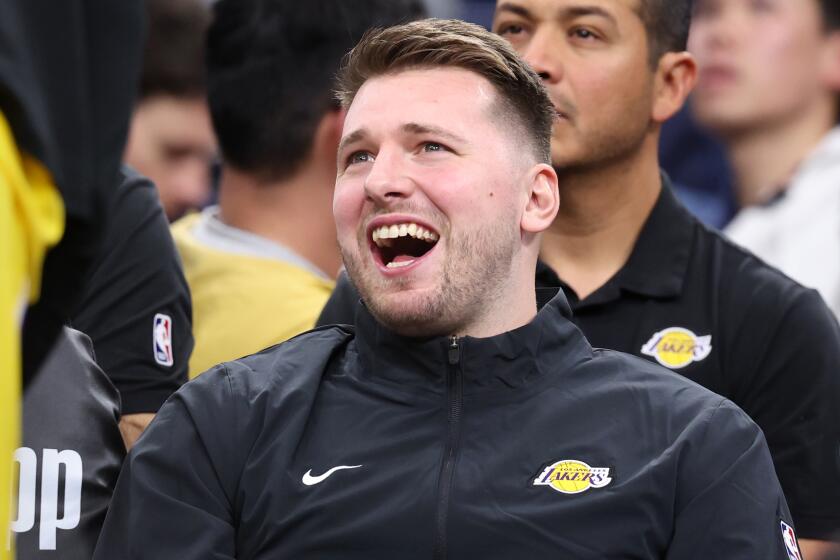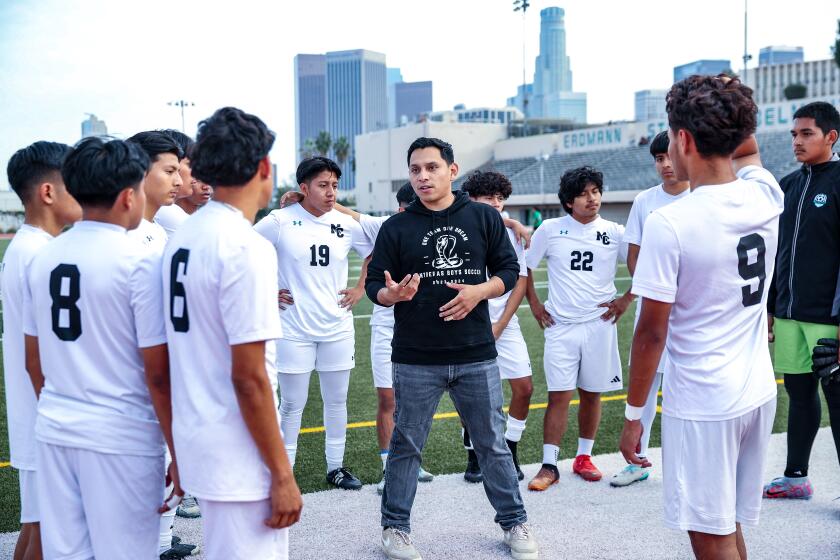SIXTH SENSE : For Wilton Guerrero, Who Could Be Latest in Unprecedented Line of Dodger Rookies of the Year, Just Earning Place--and Paycheck--in Majors Is Answer to His Prayers
- Share via
VERO BEACH, Fla. — Wilton Guerrero walks into the Dodger clubhouse and stares, wondering if he can ever get used to such extravagance.
The refrigerator is full. There are sandwiches and pasta for lunch. There is hot soup. There is every kind of fruit. There are all of the sunflower seeds and bubble gum you can chew.
Eat as much as you want, when you want. And it’s all free.
Having grown up where a glass of cold milk is a delicacy, Guerrero bites his lip, making sure he doesn’t cry.
“This is a dream, a dream come true,” he says in broken English. “You don’t understand. This is all I ever wanted. Not so much for me, you understand, but for my family.
“You see, I got to play baseball because my family is so poor. They need me.”
Guerrero is 22 and his body has yet to mature. Still, in some ways, he feels like a middle-aged man.
Guerrero grew up in a tiny village, Nizao Bani, in the Dominican Republic, in a house with four brothers and sisters. They never quite knew when the next meal was coming.
Their father drove an airport van, but his paycheck hardly covered the bills. He also had four other children to support.
Their mother wasn’t around most of the time. Desperate to provide for her children, Eliesei Guerrero worked as a maid in Venezuela and was gone 10, maybe 11 months at a time. Wilton wept each time she left.
There was no running water, no electricity. There was a family bicycle, and meals consisted of rice, beans and bread.
“You couldn’t even call it a house, where they lived,” said Ralph Avila, Dodger vice president in charge of Campo Las Palmas in the Dominican. “It was a shack. The family is very religious, very decent people, but very poor.”
Guerrero would awaken at sunrise every morning and run to the dirt streets with the other kids to play baseball.
“It was all I had, it was all any of us had,” Guerrero says, breaking into a grin. “We knew this is the way out. This is how you survive.”
Guerrero played barefoot and used a milk-carton glove. Balls were rocks wrapped with old socks and tape, and bats were limbs from guava trees.
“It’s not so bad. Let me show you,” he says, tearing a piece of cardboard from a box of bats. He bends the cardboard, cuts a hole in the middle and proudly displays an authentic Dominican glove.
It was what he used until 1991, when an older brother bought him his first real glove. Guerrero cried, vowing to use it to get to the big leagues.
“That’s why I dropped out of school,” he says. “I don’t want to go to school. I have to play baseball.”
Guerrero quit school after seventh grade. He was 14.
“An eighth-grade education is mandatory in the Dominican, but nobody enforces the rule,” Avila said. “And very few kids last that long in school.
“Out around the sugar mills, very few of the cane workers want their kids to come into town to school. They want them to cut cane.
“But when it isn’t harvest time, there’s nothing for the kids to do but play baseball.”
It’s no coincidence that the Dominican part of the island--Haiti occupies the western third--produces many good players. The Dodgers alone have Raul Mondesi, Ramon Martinez, Pedro Astacio and Nelson Liriano.
“Sugar cane and baseball are the natural resources for the Dominican Republic,” Dodger hitting coach Reggie Smith said. “Really, Wilton is one of the lucky ones.”
Guerrero, without school to attend, sold fish each day in the market. Every peso he earned went to his family. He asked only for enough time to play baseball.
“It’s all I ever wanted to do since I was 3, maybe 4 years old,” he says. “I wanted to be like Tony Fernandez. I wanted to be a major league baseball player.”
The first phase of Guerrero’s dream came true when he turned 16. The Dodgers offered him $5,000, more money than he had ever seen.
He accepted the check, signed it and handed it over to his parents.
“This kid will do anything for his family,” Avila said. “You can’t find anybody better than him. . . .
“When he steps onto the field for the first time this year, I’ll be so happy for him. It will feel like I’m out there. That’s how special he is.”
Guerrero, who is hitting .373 this spring, with 10 RBIs and no errors, will become the Dodgers’ first rookie second baseman to start opening day since Steve Sax in 1982. He says that stepping onto the field April 1 against the Philadelphia Phillies will be the happiest day of his life.
He has arranged for his father and mother to be with him at Dodger Stadium and his mother plans to stay. She will live with Guerrero during the season.
“I tell my mom she won’t have to work anymore,” says Guerrero, who will earn $155,000. “She can be with me now. I want to buy them a new house in the Dominican. Maybe even a car.
“I am blessed, no?”
Guerrero takes off his baseball cap, shows the underside of the bill and proudly displays the inscription: “Dios & Yo”
“It means God and myself,” Guerrero says. “God looks out for me. My life is God, you understand.”
Guerrero still is trying to get accustomed to American baseball life. He hears profanity and shakes his head at the young women hanging around to meet players.
“It’s a big transition for him,” coach Manny Mota said. “He’s so shy, so quiet. He’s very timid.
“We tell him, ‘Don’t be afraid. Don’t hide. Communication in this game is very important.’
“He will be OK, it will just take time.”
Guerrero, who grew from a scrawny, 155-pound kid to a muscular 183-pound man over the winter, instantly takes on the burden of protecting the Dodgers’ National League rookie-of-the-year streak.
He has a good shot at the award, but there’s someone with maybe an even better one. Guerrero knows him well, knows his strengths, his weaknesses.
After all, they were roommates for 16 years.
Wilton’s 21-year-old brother, outfielder Vladimir Guerrero of the Montreal Expos, is considered the best prospect in baseball.
“It would be great if it’s one of us that win the award,” Wilton Guerrero says. “Then, at least, it would be in the family. Vladimir, I believe, is going to be a great, great player.”
The Dodgers could have had both Guerreros. They had both in their Dominican camp, and Vladimir even wanted to sign with them. The Dodgers passed, electing to sign only Wilton.
The mistake was made, the Dodgers acknowledge, when they compared Vladimir to his older brother, Albino, who signed in the early ‘90s with them. Albino never improved, though, and was released after two years. The Dodgers looked at Vladimir and thought they were seeing Albino all over again.
“We thought Wilton was a major league prospect from the first day,” Avila said. “But the reason we missed on Vladimir is because he looked to me more like Albino. Really, he looked like his twin brother. Same mannerisms. Same body. Everything.”
Vladimir could have stayed in the Dodgers’ Dominican academy, but decided to sign with the Expos. He is much bigger than Wilton, 6 feet 2, 200 pounds, and is much stronger, just as fast and has the potential to become one of the game’s biggest stars.
“I played with Raul Mondesi when he was a rookie, and Vladimir is better,” said Expo outfielder Henry Rodriguez, a former Dodger. “It surprises me to see all that talent in one guy. It makes you think of Roberto Clemente.
“He has people nervous every time he comes to bat. He has all the talent to be a star in the game for a long time.
“He is going to make a lot of money.”
The Dodgers have many of the same expectations for Wilton. Perhaps he will never be a Joe Morgan, but they expect greatness from the switch-hitter.
Just with his speed alone--4.5 seconds in the 40-yard dash--the Dodgers project he will hit at least .280 with 20 stolen bases this season. In time, they figure, he will hit .300 with 50 stolen bases a year.
“Wilton has all of the ability in the world,” Avila said. “I remember Tony Fernandez and Alfredo Griffin and Rafael Santana at the same age. They can’t compare.”
Guerrero, who prefers to try speaking English rather than using an interpreter, grins and says he hopes he can be as good as everyone predicts.
And it makes no difference to the brothers who becomes a bigger star.
The way they figure it, if they stay in the big leagues all season, they can buy a beautiful new home in the Dominican for the family.
“I’ve been praying a long time for this,” Guerrero says. “Maybe now my prayers will come true. It is the dream of my life.”
(BEGIN TEXT OF INFOBOX / INFOGRAPHIC)
A RUN ON DODGER ROOKIES OF THE YEAR
1992, KARROS
Batting Avg. .257
Hits 140
Home Runs 20
RBI 88
*
1993, PIAZZA
Batting Avg. .318
Hits 174
Home Runs 35
RBI 112
*
1994, MONDESI
Batting Avg. .306
Hits 133
Home Runs 16
RBI 54
*
1995, NOMO
Record 13-6
Innings 191 1/3
Strikeouts 236
ERA 2.54
*
1996, HOLLANDSWORTH
Batting Avg. .291
Hits 139
Home Runs 12
RBI 59
Other Leading Rookies
* Vladimir Guerrero, OF, Montreal: Wilton’s brother. Hit .360 and was the MVP of the double-A Eastern League.
* Andruw Jones, OF, Atlanta: Zoomed through three levels of the minors last season; homered in first two at-bats in the World Series.
* Kevin Orie, 3B, Chicago: Hit .298 in double-A and triple-A, co-MVP of the Arizona Fall League.
* Scott Rolen, 3B, Philadelphia: Homered twice against Hideo Nomo in August. Maintained rookie status when broken arm ended year early.
* Dmitri Young, 1B, St. Louis: Led triple-A American Association in batting (.333) and runs (90).
More to Read
Go beyond the scoreboard
Get the latest on L.A.'s teams in the daily Sports Report newsletter.
You may occasionally receive promotional content from the Los Angeles Times.










